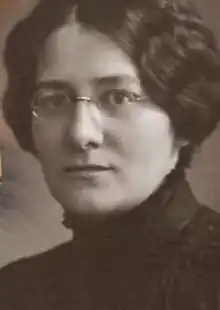
Bertha Koessler-Ilg (1881–1965) was a German-born Argentine nurse who is remembered for her work as a folklorist. While young, she spent some time with her uncle, the German consult of Malta, documenting the folklore of the island. In 1912, she married the physician Rudolf Kössler and emigrated with him to Argentina. There they settled in the remote Patagonian town of San Martín de los Andes where she developed friendships with the local Mapuche inhabitants. As a result, over the years she was able to record their stories and traditions. From 1940, she wrote several works in this connection, including Tradiciones araucanas (1962). This forms part of Cuenta el Pueblo Mapuche (The Mapuche People Tell Tales) published in 2006.[1][2] [3]
Early life
Born in Obernzell, Bavaria, in 1881, while still young Bertha Ilg spent some time on the island of Malta together with her uncle who was the German consul.[4] While there, she investigated the folklore and traditions of the island's original inhabitants.[2] By 1906, she had successfully translated the tales collected by Manuel Magri into German.[5][6]
After completing her training as a nurse in Frankfurt, she met and married the physician Rudolf Kössler (born 1889) from Munich.[7] As she was not only several years younger but a Catholic while he was a Lutheran Protestant, they married well away from their parents in Genoa, Italy. In 1912, they moved to Buenos Aires and worked in the city's German hospital. In 1913, their first daughter was born and Bertha returned to Germany to show her to her parents. While there, she was surprised by World War I. As a Red Cross nurse, she was present at the Battle of Verdun. After the war was over, in 1920 she was able to return to Argentina with her daughter.[8]
Encouraged by a compatriot who lived there, they moved to San Martin de los Andes which with 400 inhabitants was still without a doctor.[8]
Career
In addition to helping her husband and raising a family, Berta Koessler increasingly took a deep interest in the traditions of the local Mapuche population. It was not always easy for her to overcome their shyness but little by little she was able to talk with them as her friends. After listening to their stories, in the evenings she faithfully wrote them up in German, explaining many of the local expressions. Her manuscripts extended to comprehensive research into the Mapuche culture, complete with poems, songs, payers, music and children's games. A significant part of her work was published in 1962.[2]
Unfortunately, despite her efforts, most of her work remained unpublished when she died in 1965.[1]
Thanks to the efforts of her children, the remainder of her findings were published in Spanish in 2006.[2]
References
- 1 2 Tapia, Patricio (13 May 2007). ""Cuenta el pueblo mapuche": Bertha Koessler-Ilg, la araucana blanca" (in Spanish). El Mercurio. Retrieved 15 March 2023.
- 1 2 3 4 Alexandria (1 February 2009). "The Mapuche People Tell Tales". Translorial. Retrieved 15 March 2023.
- ↑ "Bertha Koessler-Ilg, la mujer que dejó escrita la tradición oral del pueblo Mapuche" (in Spanish). Neuquên uno. Retrieved 15 March 2023.
- ↑ "History Of Maltese Folk Song". Malta Independent. 12 September 2010. Retrieved 15 March 2023.
- ↑ Jos. Cassar Pullicino, Jos. Casssar (1947). "Folklore Research in Malta". Folklore. Jstor. 58 (3): 328–334. JSTOR 1257149. Retrieved 15 March 2023.
- ↑ Ilg, Bertha (1906). "Maltesische märchen und schwänke aus dem volksmunde gessammelt" (in German). G. Schönfeld. Retrieved 15 March 2023.
- ↑ "El médico alemán que trajo al mundo a políticos neuquinos" (in Spanish). Rio Negro. 16 February 2020. Retrieved 15 March 2023.
- 1 2 "Rodolfo Koessler – El machi del Lanín" (in Spanish). Neuquên uno. Retrieved 15 March 2023.